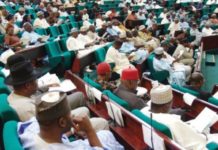
EXCLUSIVE: How Health Ministry Scuttled Plot to Frustrate Multi-billion Naira Malaria Project
Contrary to federal lawmakers’ allegation that the Ministry of Health misappropriated $300 million in antimalarial funds, an international agency is behind the attempt to prevent the money from being used for the project in Nigeria.
The House of Representatives Committee on Malaria, HIV/AIDS, and Tuberculosis recently summoned the Minister of Health and Social Welfare, Prof. Mohammed Pate, and the Permanent Secretary, Daju S. Kachollom, over the alleged misuse of the multibillion-naira antimalarial project.
The Chairman of the Committee, Amobi Ogah, while expressing his displeasure over the ministry officials’ absence at the committee’s resumed sitting, disclosed that the money was made available in 2021.
Meanwhile, Economic Confidential discovered that the Federal Ministry of Health and Social Welfare, under the leadership of Dr. Osagie Ehanire (the immediate-past Minister) and Prof. Pate (the incumbent), actually prevented an international agency from sabotaging the healthcare project designed to eliminate malaria and encourage local production of healthcare products.
This is contrary to the allegation that Prof. Pate and his Permanent Secretary misappropriated $300 in antimalarial funds.
While the project aims to tackle the malaria scourge in Nigeria, Economic Confidential also gathered that its consultant, the United Nations Office for Project Services (UNOPS), attempted to override the Federal Government by settling for foreign healthcare suppliers.
Recall that on September 5, 2022, Nigeria signed an agreement with UNOPS to acquire long-lasting insecticide nets. The nets were billed to be distributed in four states—Bayelsa, Edo, Enugu, Kogi, and the Federal Capital Territory Abuja—to eliminate the scourge of malaria.
Immunisation Plus and Malaria Progress was the project by Accelerating Coverage and Transforming Services (IMPACT).
The agreement provides four years to execute the IMPACT project, with the First Tranche of $30 million already paid to UNOPS in September 2022 during President Muhammadu Buhari’s tenure. However, despite the MoU and the extant laws on local content, Economic Confidential gathered from credible sources that UNOPS is working to circumvent the process. “The UN organ is planning to import mosquito nets into the country,” one of the sources said.
Under the ‘malaria fight’ agreement, UNOPS’s only role is to identify local manufacturers and/or suppliers. If local manufacturers are unavailable, the agency is not in any way contracted to carry out an international tender to recruit international suppliers who would import the healthcare products.
However, the government’s confidence in the UN agency is not being met following what stakeholders describe as underhand practices to enlist the services of foreign suppliers to import mosquito nets against the recommendation by the Federal Ministry of Health, National Malaria Elimination Programme (NMEP), the World Bank, and the Procurement Consultant IMPACT.
Following the MOU that provided that the bidding process must be competitive, UNOPS opened the first bidding on Thursday, June 2, 2022, calling for an “expression of interest for the supply of locally manufactured long-lasting insecticide mosquito nets” as directed by the Federal Government that the nets must be sourced locally.
Read Also:
To qualify, the UN agency said, “The nets are expected to be produced and packaged in Nigeria, and both NAFDAC and WHO certification are required to deliver the project within 12 months.”
In its publications sighted by Economic Confidential, UNOPS promised to conclude the procurement process by 6 December 2022 and start delivering the LLINS for the 5 states by August 7, 2023.
However, things took a dramatic turn when UNOPS ignored the Health Ministry’s mandate and cancelled the bidding process without informing the Federal Government, as stipulated in the agreement.
Instead, in a publication on Monday, February 6, 2023, it announced that vendors should visit its website to bid for the LLIN project, which it said was posted on February 3. The bidding process is expected to end on February 20, 2023.
Economic Confidential further gathered that Dr Ehanire, in a letter before leaving office last year, also frowned at the delay and UNOPS’s scheming to arrogate to itself a mandate beyond the scope of the MOU and ordered the conclusion of the tendering process immediately.
In the letter dated May 24, 2023, the former Minister wrote UNOPS, drawing its attention to the MOU, ordering that “in compliance with Executive Order 003, your office is expected to honour the directive on local content, while by the provision of the MOU, the process for the procurement of LLIN, one of the products manufactured in Nigeria, should have been concluded by December 6, 2022.”
While drawing UNOPS’ attention to the delay in the commencement of the tender till December 13, 2022, instead of concluding it by December 6, 2023, and its plan to conclude the exercise by March 21, 2023, through international competitive bidding, the former Minister said the agency was “in breach of the MOU, and contravention of the Executive Order 003 and 005 of the government, which could trigger litigation involving all stakeholders, who bear the consequences of a delay in the procurement of these products.”
Ehanire explicitly reminded UNOPS that “the President issued the Executive Orders to protect Nigerian industry by ensuring patronage of WHO prequalified products manufactured in Nigeria. Where there is a sole domestic product manufacturer in Nigeria, our procurement laws allow effective market survey and price benchmarking to achieve value for money, especially when all other conditions are met.
“On these grounds, the abrupt cancellation of the tender does not sit well with us. Disregarding WHO-certified products locally manufactured in Nigeria violates the Executive Order.”
Meanwhile, Economic Confidential cannot confirm if President Bola Ahmed Tinubu’s recent caution against excessive summons of government officials is related to the threat by Ogah ‘s committee to order the arrest of the Health Minister and the Permanent Secretary for being physically absent from their sitting.
Speaking at the breaking of the Ramadan fast (Iftar) with the Speaker of the House of Representatives, Tajudeen Abbas, and the House leadership, President Tinubu appealed to members of the National Assembly to exercise restraint in summoning heads of ministries, departments, and agencies of government (MDAs) to appear before parliamentary committees.
Tinubu said while legislative oversight is essential for maintaining transparency and accountability in governance, excessive summoning of officials can disrupt operations and hinder service delivery to citizens.
He, therefore, urged lawmakers to show discretion in exercising their oversight powers.










































